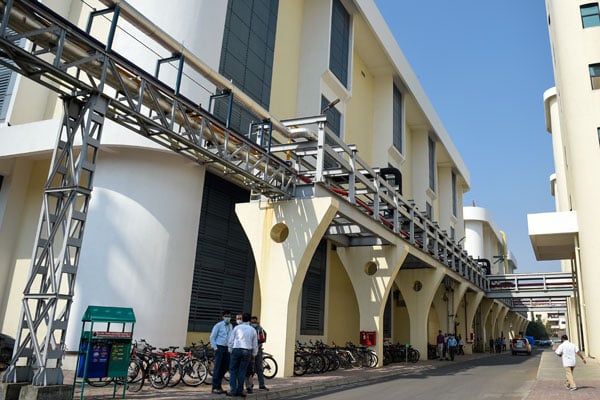Prime
Govt to import 18 million Covid jab doses

A general view of the campus is pictured where AstraZeneca-Oxford's Covid-19 coronavirus vaccine is being manufactured at India's Serum Institute in Pune on January 22, 2021. PHOTO/AFP
What you need to know:
- According to government the vaccines are expected in the country by April or May.
- To benefit: The vaccine doses will cater for nine million people; those of 50 years and above, among others.
Government is set to procure 18 million doses of Covid-19 vaccine to cater for nine million Ugandans with each person taking two jabs.
Ministry of Health together with the National Medical Stores (NMS) have ordered 18 million doses of Astra Zeneca from Serum Institute of India.
These vaccines cater for persons aged 50 or above, those with underlying health conditions, health workers, security personnel and teachers, among other essential social service providers.
“Each eligible individual will receive two doses separated by 28 days. The order placed will only be confirmed upon remission of $5m as down payment,” Mr Dennis Katungi, the communication and media relations manager at the Uganda Media Centre, said yesterday.
Each dose will cost government $7 (about Shs25,000) which translates into $14 (about Shs51,000) per person.
However, with international transportation and handling by NMS, which cost $3, the total cost for vaccine regimen will be $17 (about Shs62,000).
Dr Monica Musenero, the senior presidential adviser on epidemics, yesterday said the Serum Institute of India is manufacturing the vaccine on behalf of AstraZeneca.
Earlier last week, Ministry of Health informed Cabinet that a vaccine request for nine million people costing $164m (Shs601b) had been submitted and that all requirements for receiving the vaccine were fulfilled.
The vaccines are expected in the country by April or May this year.
According to the Economic Times website, an Indian English-language business-focused daily newspaper, last updated on January 26, the Serum Institute of India (SII) will supply Saudi Arabia with three million AstraZeneca doses priced at $5.25 each.
The website further states that SII is also supplying South Africa with 1.5 million doses at the same price of $5.25 (about Shs19,246) each on behalf of AstraZeneca.
Brazil received two million doses of the vaccine from SII and Mr Adar Poonawalla, the chief executive SII, said it also paid about $5 per dose, according to the website.
Asked why Uganda is procuring the vaccine dose at $7 compared with the $5 for other countries, Mr Emmanuel Ainebyoona, the Ministry of Health spokesperson, referred us to the Permanent secretary and director general of health services.
However, the officials did not answer our repeated calls. Other officials at the Ministry asked the public to wait for the President’s address.
Earlier reports indicated that the AstraZeneca vaccine would cost $3 to $4 per shot and $6 to 8 per dose on the private market.

This illustration picture taken in Paris on November 23, 2020 shows a syringe and a bottle reading "Covid-19 Vaccine" next to AstraZeneca company and University of Oxford logos. PHOTO/AFP
Meanwhile, Covid-19 Vaccines Global Access Facility (COVAX) managed by Global Alliance for Vaccines and Immunisation (GAVI), has communicated to government a tentative allocation of at least 3 million doses of Astra Zeneca vaccine by end of February or beginning of March this year.
“The indicative doses are expected to be available to Uganda on quarterly basis, 35 to 40 per cent available in quarter one and 60- 65 per cent in quarter two,” the statement on Cabinet resolutions reads in part.
Mr Katungi who presented Cabinet decisions on behalf of Mr Ofwono Opondo, the executive director of Uganda Media Centre, said there is also an emerging opportunity for acquiring vaccines through African Union mechanism coordinated by African Vaccines Delivery Alliance.
The decision by Cabinet comes at a time when there is a growing interest from private sector to participate in the Covid-19 vaccination efforts.
As per Cabinet decisions, private sector participation will be guided by the national task force and Ministry of health has developed a draft concept note to that effect.
Currently, the country is in stage four of the pandemic characterised by community-wide spread.
While paying tribute to fallen Second Deputy Prime Minister Kirunda Kivenjinja and Kyotera District Woman MP Robinah Ssentongo who both succumbed to Covid-19 last year, the Leader of Opposition in Parliament, Ms Betty Aol Ochan said many people are dying because they can’t afford Covid-19 testing fees.
Ms Violet Akurut, the Katakwi Women MP, said: “The death of legislators was supposed to be an eye opener but it seems we learnt nothing. Government should come out and tell us how prepared we are for this pandemic. Some of us are privileged to take free tests, but how many Ugandans can afford the test?”
The State Minister of Environment, Ms Betarice Atim Anywar, appealed to government to equip health centres with more intensive care unit beds.
[email protected]





